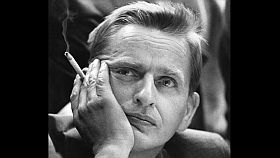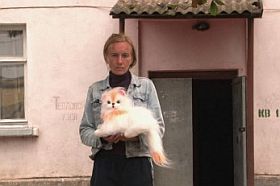Voilà, there you are in Malmø so close to Copenhagen, the home city of your correspondent, who after a good half hour of train trip took the escalators up from the deep Triangle Station to be at a square named after the local director icon, wonderful Bo Widerberg. Respect, Malmø, for this tribute, we don’t honour our artists like that on the other side of Øresund!
5 minutes walk from the station and your are at the Scandic Hotel to get your accreditation for the Nordisk Panorama that celebrates its 24th edition, a festival that from this year on will be situated in Malmø. For a Copenhagener a good close-by solution but for the Finns and the Norwegians?
Anyway, up to the third floor of the glass house, to the market of the festival where I – representing filmkommentaren.dk – spent some hours to watch some of the films in the documentary competition. Did not have time for, would have loved to see more.
There are 15 films in the documentary competition, the most prestigious of the sections of the festival with an award of 11.000€ for the director of the chosen film… who will win? Main favourite must be ”The Act of Killing”, already awarded at many festivals around the globe and for sure a milestone in modern documentary. I sat down at the marketplace to watch if there could be anyone to compete with Oppenheimer’s film that has (many festivals have done the same) given the still photo of its opening surreallistic dancing scene to be the cover of the fine catalogue that the festival has published.
I did not see all the films but of those I did manage to watch, or had watched before the festival, I found that Finnish Virpi Suutari’s social ”Hilton-Here for Life!” had a lot of commitment but became a bit ”and then we have this
character, and then this youngster and that one…”, predictable and with a noisy soundtrack that does not let the images get a life – but kill them. Which they do, get a life, in Susanna Helke’s ”American Vagabond” that i saw half of via a dvd given to me by the editor Niels Pagh – I felt it was very distant to the homosexual couple in the film and got irritated that the images on my computer were so dark that I gave up watching. As for the Danish ”My Love – the Story of Poul and Mai” it is very sweet and loyal to the Danish fisherman and his Thai partner, but the film of Iben Haahr Andersen is a tv-documentary with interview after interview, banality after banality in scenes, that raises the question, whether it belongs to a film festival.
Margreth Olin from Norway has as always made a very strong, open and honest documentation of young people in Europe, ”Nowhere Home”, in casu Norway, filmed in a detention centre, where kids wait to become 18 years old, the age where they will be sent back to their homes. It is very touching and Olin is involving herself in the narrative in and outside her rich country.
However, the only film, from what I had time to see, that could be the winner of Nordisk Panorama 2013, if the jury decides to ”take out” ”The Act of Killing”, as it has got so much attention already, of course a discutable argument, is Swedish Mia Engberg’s beautiful ”Belleville Baby”.
Why, because it has a feeling, an atmosphere, a personal tone (the director’s own voice and her text is excellent) and a well told story from the past, where the director fell in love in Paris, lived with him for some time, experienced him becoming a criminal, because of his immigrant background, an honest film that also includes reflections on the fimmaker wanting to convey the good story, whatever the subject of the story thinks… it is so well made with a mix af material – super 8 blurred images, photos, newsreels and tv-reports from riots in France, home video from the director with her small son, all framed by the myth of Orpheus and Eurydike. An essay film on remembering, and remembering different moments and events, maybe they never took place. Impressive work by Mia Engberg.
Tuesday (tomorrow) night, awards will be announced, and not only for this competition section that I had the chance to dig just a bit into.
http://www.nordiskpanorama.com/




